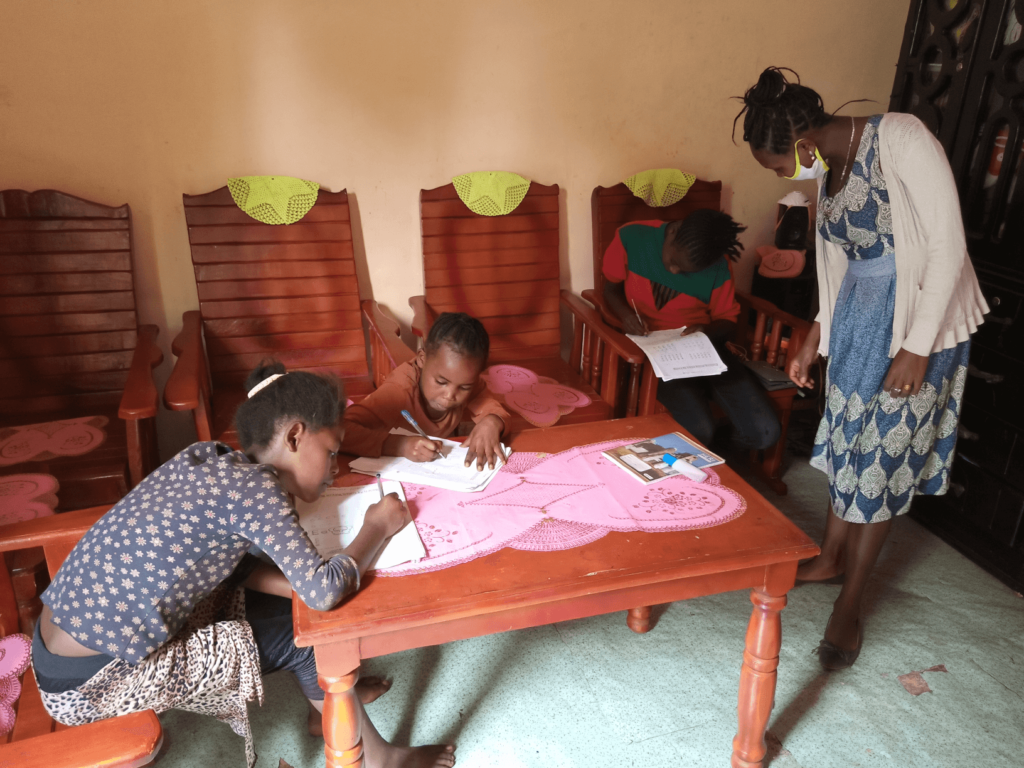Educating children is one of the most effective ways to reverse the relentless trend of poverty that continues to devastate rural agrarian and pastoralist communities. In Ethiopia, millions of children are out of school not only because of cultural resistance but because of poverty – the main barrier to children’s education. In many cases, the effects of lack of education are more prominent amongst females than males, particularly those living in rural communities, those who come from illiterate families and those who are economically disadvantaged.
What has often been labelled as ‘time-poverty’, a term used to describe the time stretched between household chores throughout the day, has been a challenge for women living in remote communities where time-saving techniques are often scarce. Without the option of attending school, girls are often faced with early marriage and tend to take on low-paid employment, where they are too often exploited.
In order to break the cycle of poverty that currently plagues rural communities in Ethiopia, People in Need has taken the lead on the CHANGE – Improving Access to Education in Ethiopia for Most Marginalized Girls project.
Since 2018, People in Need (PIN) together with its partners from Alliance2015 – Concern Worldwide, Welthungerhilfe, Helvetas and also the Italian Association for Aid to Children (CIAI), has been working on improving the life chances of out of school, highly marginalized girls by improving their access to education and establishing alternative basic education and integrated functional adult education opportunities.
Funded by UK aid from the UK government, the project is part of The Girls´ Education Challenge (GEC) program, the largest global fund dedicated to girls‘ education and it is being implemented in four regions of Ethiopia: Amhara, Afar, Oromia and the Southern Nations, Nationalities and Peoples Region (SNNPR).
The program targets girls who have dropped out or never attended school before: they are identified based on need rather than academic performance or potential. To ensure a proper learning environment, the project has invested in training several facilitators and has provided funds for the provision of textbooks and stationery, the renovation of classrooms, the construction of new latrines in the target school compounds. Results were immediate; the net primary school enrollment in target areas increased.
After COVID-19 hit Ethiopia in March 2020, the government closed down schools to reduce contact and save lives. As a result, nearly 25 million kindergarten, primary, secondary and tertiary level learners have been forced to stay home. Although this disruption has threatened to exacerbate major existing challenges like food security, internal displacement and other disease outbreaks, the impact it has on the education system is especially significant.
A home-to-home teaching strategy
In response to the COVID-19 outbreak, the CHANGE project has devised a home-to-home and distant teaching strategy to reach girls who had already enrolled in the program. With poor radio access and limited or no internet, the project team had to focus on in-person activities through its field facilitators. Each facilitator has been allocated small clusters of 25-30 girls who meet five times a week for 2-3 hours of basic literacy and numeracy lessons. Each lesson consists of one facilitator and three children at a time. In order to reduce contact to prevent the spread of COVID-19, strict rules to maintain social distancing are enforced, and personal protective supplies such as face masks, sanitizers and soaps are supplied during every lesson.

Home to home teaching, PIN Ethiopia 2020 
Bethelhem Adugna, one of the project officers, describes the home-to-home teachings in this way: “We had to rethink our approach and apply new strategies because we didn’t want the girls staying home for too long and reverting back to their usual routines. It was critical to the program that these girls didn’t forget what they were taught in the past year, so that they can enter their second year with the knowledge they acquired from the previous year.”
In order to cultivate healthy communication and a supportive environment between parents and children, “a one-on-one awareness raising session is regularly held with parents so the girls can make the most out of every lesson. In these sessions, parents are taught about the importance of education for their child. They’re advised to allow their children to cut back on household chores so they can complete their assignments on time and to allow their child to get enough sleep so they are rejuvenated for their next lesson,” says Bethlehem.
Educated women tend to live healthier lives, earn higher wages, marry at a later age, have smaller families, and likely continue these trends with future generations. And all this combined can assist in lifting communities out of poverty. However, as with many things rooted in tradition, it will continue to take a lot of work before educational inequality becomes a thing of the past for women.
Author: Melikte Tadesse, PIN Ethiopia Communication


